
If you’ve ever wondered what makes a professional chauffeur different from an ordinary driver, you’re not alone. Across the U.S., top chauffeur services take serious steps to ensure every driver is highly trained, trustworthy, and ready to deliver exceptional experiences. This article breaks down how professionalism is built into every ride, from screening and training to appearance, attitude, and service.
Why is driver professionalism so important?
Professionalism in chauffeur services isn’t just a luxury it’s a necessity. When passengers step into a chauffeured vehicle, they expect safety, punctuality, courtesy, and discretion. Whether it’s a business executive catching a flight or a couple heading to a wedding, the chauffeur is responsible for creating a calm, reliable, and respectful environment.
A truly professional chauffeur knows how to make clients feel valued and secure, all while delivering a seamless travel experience. This level of service is the result of careful hiring, consistent training, and high standards enforced by the company.
How are chauffeurs selected and screened?
Becoming a professional chauffeur isn’t as simple as just having a driver’s license. Reputable companies implement a rigorous hiring process designed to filter out anyone who might not meet their standards.
Drivers usually begin with a detailed application that includes work history, driving records, and personal references. If that passes review, candidates are invited to interviews where companies assess their communication skills, professionalism, and familiarity with local roads and etiquette.
One key part of screening is evaluating driving history. Companies typically request Motor Vehicle Records (MVRs) to ensure candidates have a clean and safe driving background. For high-end services, even minor infractions might disqualify a candidate.
What type of training do chauffeurs receive?
Once hired, drivers often undergo several layers of training before ever picking up a passenger. This isn’t just a one-time orientation it’s a continuous investment in quality.
Initial training usually includes:
- Defensive driving techniques to handle city, highway, and extreme weather conditions
- Route optimization and knowledge of traffic patterns
- Client etiquette, such as opening doors, managing luggage, and respecting client privacy
- Vehicle care, including cleanliness, maintenance checks, and in-vehicle presentation
Some companies even use role-play scenarios and written exams to ensure chauffeurs are fully prepared.
How do background checks and safety standards work?
Passenger safety is a top priority. To meet this standard, companies conduct extensive background checks during the hiring process. This includes:
- Criminal background checks across state and federal databases
- Drug testing (pre-employment and random testing)
- Fingerprinting in certain states for added security
Additionally, chauffeurs are required to adhere to local and federal regulations, which may include obtaining commercial driver’s licenses (CDLs), permits, and undergoing medical exams.
What’s expected from a chauffeur’s appearance?
First impressions count, especially in the luxury transportation industry. That’s why companies enforce strict dress codes. Most require:
- A tailored black or navy suit
- White or light-colored dress shirts
- Polished shoes
- Neatly groomed hair and facial hair
- No visible tattoos or excessive jewelry
Chauffeurs also carry themselves in a composed, confident, and respectful manner. The goal is to exude reliability and class from the moment a client sees the vehicle.
How do chauffeurs handle customer service?
Unlike standard drivers, chauffeurs are trained to deliver hospitality-level service. They’re expected to:
- Greet clients with professionalism and a smile
- Open doors and assist with bags
- Adjust temperature or music based on the client’s preference
- Maintain discretion no unnecessary conversation, and certainly no eavesdropping
Many companies emphasize soft skills just as much as driving ability, recognizing that how a chauffeur interacts can define the overall experience.
How is ongoing performance monitored?
Hiring and training are just the beginning. Professional chauffeur services use multiple tools to track and improve performance long-term:
- GPS systems to monitor routes, speed, and driving behavior
- Dashcams for safety verification and dispute resolution
- Customer feedback forms sent after rides
- Mystery riders who evaluate real-time service quality
If a complaint is filed, companies investigate quickly often within 24 to 48 hours reviewing tech logs and speaking to both the passenger and the driver.
How is technology used to support professionalism?
Modern chauffeur fleets use technology to improve service quality. Chauffeurs often work with:
- Driver apps for managing pickups, notes, and route changes
- Live tracking for clients or dispatchers to ensure punctuality
- Real-time communication with customer service teams
- Passenger profile tools to accommodate repeat preferences
This tech doesn’t replace human professionalism it enhances it.
Are chauffeurs properly licensed and insured?
Absolutely. Reputable companies ensure that their chauffeurs:
- Hold the required state or city chauffeur permits
- Are covered under commercial auto insurance
- Follow all Department of Transportation (DOT) and local laws
This legal compliance provides peace of mind for both the company and the client.
Final thoughts
When you hire a professional chauffeur, you’re not just booking a ride you’re investing in a safe, seamless, and polished experience. Behind the scenes, companies are doing the hard work: screening drivers, training them thoroughly, monitoring their performance, and ensuring they’re dressed and ready for any client.
If you value professionalism, discretion, and safety in your ground transportation, services like Limo Network Nationwide stand out nationwide. Their chauffeurs represent the highest standard in the industry, delivering peace of mind from pickup to drop-off.






